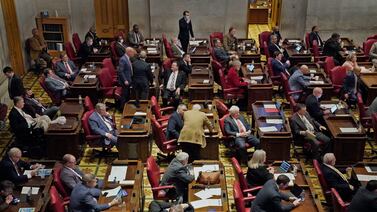This was a head-spinning week for Newark high schoolers.
On Saturday, the Newark school board became the first in the state to require high school seniors to apply for college financial aid in order to graduate. But students barely had time to consider the new rule, which would have applied to this year’s seniors. On Thursday, following an online uproar, the board scrapped it.
The stunning reversal was not a disavowal of the policy, according to board members who took pains Thursday to say they support the idea of requiring students to fill out the Free Application for Federal Student Aid, or FAFSA. The application is the first step in receiving federal grants and loans for college, as well as certain scholarships and state money, and data suggests that students who complete the FAFSA are more likely to enroll in college.
Rather, the about-face was an acknowledgement that the board had not fully vetted a major policy change that has the potential to keep students from earning diplomas, board members said. The move was also an implicit rebuke of Superintendent Roger León, who had asked the full board to vote on the change Saturday without providing a written policy in advance and after a board committee had already rejected the idea.
“My concern isn’t exactly with the graduation policy itself but the process by which it was developed,” said board member A’Dorian Murray-Thomas at Thursday’s meeting, adding that she supports the idea of requiring students to complete the FAFSA. “This process took place within the span of 10 minutes on Saturday, lacked thorough community input, it bypassed board protocol, and it failed to clearly state how all students will be protected in the policy.”
The idea of making FAFSA completion mandatory is catching on across the country. Three states are in the process of requiring students to apply for college aid in order to graduate, and at least a dozen others are considering similar rules. Last week, New Jersey lawmakers proposed a bill that would require all local school boards to add FAFSA completion to their graduation requirements.
Newark has previously signaled its commitment to the FAFSA. A citywide coalition that includes the district, local universities, and private-sector partners has sponsored workshops and outreach about the application as part of a larger effort to steer more Newark students into college.
León wanted the district to go a step further by mandating FAFSA completion. Doing so would ensure that college-bound seniors access all the financial aid they’re eligible for, and could convince students who are worried about the cost of college that it’s actually affordable, he argued.
However, the superintendent failed to convince the board that the district had fully considered how it planned to roll out the new policy. Board members asked whether the district would exempt students whose parents are or who are themselves undocumented immigrants, as such students are ineligible for federal aid. They also asked what would happen to students who aren’t able to access their parents’ tax records, which the FAFSA requires.
Board members raised some of those concerns at a committee meeting where León floated the new graduation requirement.
“The committee said, almost overwhelmingly, heck no, no, no,” León said Saturday, noting board members’ concerns about students who are undocumented immigrants.
But rather than create a detailed policy proposal that addressed those concerns, León simply asked the full board to vote on his plan during a board retreat on Saturday. The policy was not on the meeting agenda, and León apparently did not give it to board members in advance. Instead, when board members asked what exactly he wanted them to vote on, he typed a one-sentence summary of the proposal in the online meeting chatbox.
A majority of board members agreed to vote in favor of León’s recommendation Saturday, while Murray-Thomas and Asia Norton abstained, citing concerns about the process. But the board appeared to have second thoughts soon after the vote, and a motion was made at Thursday’s meeting to rescind the new policy.
In response to the pushback, León agreed to recommend that the board scrap the FAFSA requirement, which a majority of members voted to do Thursday.
Norton, among other board members, said she still supports a FAFSA requirement in theory. But she wants details about which students the district will exempt, she said. She and other board members also said they want to involve students, parents, and educators in a discussion of the policy and how best to enact it.
“We went through the process so quick that it kind of left out voices,” she said during Thursday’s meeting. “I definitely look forward, not just for the board, but for the community to be a part of this dialogue.”
The FAFSA requirement had also sparked a debate among some community members who posted hundreds of comments on Facebook about the issue. Some said they saw no problem with the rule, which they believe could nudge more students to college. But others said it was inappropriate, as some students may not want to attend college and some parents may not want to hand over their financial records. Still others questioned why the board had not held a thorough debate on the issue.
The speed at which the district pushed the FAFSA requirement and the lack of implementation plans appeared to trouble many board and community members. States that have adopted similar policies spent considerable time crafting programs that include clear procedures for exempting certain students and extensive training and support to help students complete the application. The National College Attainment Network advises states that adopt mandatory FAFSA rules to wait at least a year before enforcing the requirement so that training and opt-out systems can be put in place.
By contrast, Newark’s policy went into effect immediately.
León, who had promised to train staffers and students on the new rule, agreed Thursday to send the policy back to committee for review. He made clear the FAFSA requirement will no longer apply to this year’s seniors, but left open the possibility that the board could readopt the rule.
“While it may not apply to the Class of 2021, it may apply to other classes in the future,” he said. “That will all be determined at a later vote, later on, in this school year.”








